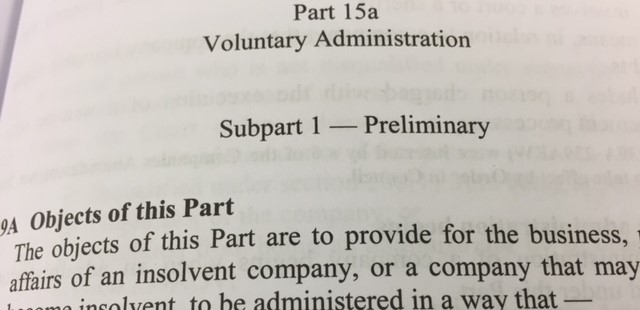One of the dark arts…..

A court appointed receiver applying to the court for determination of his remuneration was subjected to 2 days cross-examination on his evidence “in excruciating detail”, with “thousands of pages” of documents being filed. In saying that the assessment of remuneration and costs is “one of the dark arts”, the Judge cut the remuneration substantially, but […]
Liquidator’s remuneration approved, and power of sale confirmed

In yet another decision on remuneration, and the power of a liquidator to sell trust assets to recoup that remuneration, a Court has found that remuneration was properly claimed on a time basis, and that the liquidator’s exercise of the power of sale over trust assets were not unreasonable. No drama. See In the matter of […]
A lesson in Chinese law from Donald Trump

President-elect Donald Trump is, apparently, litigious, with, it is said, at least 3500 in the US federal and state courts. He has also been a litigant in China – indeed the first president elect of the United States as litigant – where he lost. Some years ago, Trump had attempted to register his TRUMP trademark […]
Trusts and liquidators’ rights of indemnity – whose decision is “universally regarded as incorrect?”

In determining that liquidators had a right of indemnity, and priority, over trust property for payment of their remuneration and expenses, the Victorian Supreme Court has said it was “bound to follow” the long established South Australian decision in Re Suco Gold, and to decline to follow the recent NSW decision in Independent Contractor Services. […]
Late payers – what to do? and the ATO wants to know as well

An inquiry into late payments to creditors has been commenced by the Australian Small Business and Family Enterprise Ombudsman. A report is due by March 2017. The inquiry aims to establish an accurate picture of the trends in payment terms that have emerged in recent years in commercial arrangements between large and small businesses as […]
Pre-packaged insolvencies – new English standards from 1 December 2016

Australia’s law reform aversion to pre-packaged insolvencies – “pre-packs” – compares with a process of their cautious acceptance and continual refinement in England. A new Statement of Insolvency Practice has been issued in the UK – SIP 13 – Disposal of Assets to Connected Parties in an Insolvency Process, which supports the guidance and rules […]
Is an ipso facto contract termination “unfair” on a small insolvent business?

New laws have commenced under the ASIC Act and Australian Consumer Law extending unfair contract term protections to small businesses. The law allows “unfair” and “standard form” contract terms to be declared void and allows for the contract to continue to bind a supplier, for example, if the contract can operate without the unfair term. An argument may […]
Australia’s draft Insolvency Practice Rules 2016 – some issues

The draft Insolvency Practice Rules raise a few fundamental issues about due process – natural justice, professional body involvement, confidentiality and transparency, being covered by me at the Traill 4th National Bankruptcy Congress on 14 November 2016; and also about ordinary insolvency process – communications, service by post, time limits, and the telephone….. The rules are […]
Reasons for Queensland Nickel’s Special Purpose Liquidators being Appointed?

Special purpose liquidators have properly been appointed by the Federal Court to some aspects of the Queensland Nickel companies of Clive Palmer but it would have been useful to know, from the Court, why. In any event, the High Court has dismissed Mr Palmer’s constitutional challenge to examination summonses issued at the request of those […]
Special purpose liquidators – merely a creditor’s whim?

Insolvency law has a mixed view of its liquidators. On the one hand they are said to be of the highest integrity, qualified and experienced, officers of the court, exercising quasi-judicial authority, investigating misconduct and pursuing public interest issues. On the other, they are seen as being susceptible to bias in favour of the […]
Joint insolvency regulat(ion)

The bankruptcy regulator, AFSA, has announced a new approach to its regulation of the 200 trustees in bankruptcy in Australia, focusing more on a trustee firm’s systems and controls and how or whether they serve to allow the trustee to meet the various legal and professional requirements. This more streamlined approach, coupled with the insolvency reforms coming […]
Traill Bankruptcy Conference – much better than the corporate alternative

Read the funding proposal for ASIC’s regulation of liquidators and understand why bankruptcy is so much more advanced. Corporate insolvency practitioners, lawyers and academics should attend the Rosie Traill Bankruptcy Conference on 14 November 2016, in Sydney, to find out how and why. Bankruptcy is the poor relation of insolvency law, with more professional, academic and media attention […]
Beneficial ownership of companies, and access to ASIC data

The government has invited us to “have our say” on what it says is “Australia’s first Open Government National Action Plan”, the draft plan being opened for public consultation on 31 October 2016. This express the government’s “ambitions” in a number of worthwhile areas. A beneficial ownership register for companies Many aspects of the Plan […]
More (and more) government inquiries

Two important Senate inquiries of 2014 and 2015 that lapsed at the election have been reinstated, but still with long reporting dates into 2017; and there is a new inquiry into ASIC’s enforcement powers. Many of these issues have been the subject of recommendations in earlier inquiries, with no action taken. Meanwhile, tax breaches, phoenix activity and other […]
ASIC before the Senate – no more scalps, goodness will prevail; complaints in the “thousands”; and the ASIC database

Senate questioning of ASIC does provide some useful information at times. In the inquiry into ASIC’s 2015 annual report by House of Representatives Standing Committee on Economics, on 14 October 2016, issues came up about: ASIC’s enforcement focus on getting “scalps”; its new behavioural economic focus on “what ‘good’ looks like” in the sectors it […]
Solomon’s Justice in Maritime China

The maritime court structure of China was first set up in 1984 and over the short period since then the 10 main courts have established a further 39 branch courts up and down the coast and along the Yangtze, surely the largest maritime court structure worldwide. Together these courts determine matters according to the Chinese Maritime […]
Insolvency Practice Rules 2016 – draft for comment

The Rules in support of the Insolvency Law Reform Act 2016 have been released in draft for comment by 4 November 2016. These follow an earlier statement of what the Rules would contain issued in 2014. The long delay has been the subject of comment on this site. The Rules The Rules are: Insolvency Practice Rules […]
New Zealand Voluntary Administration Law – an independence challenge to the administrators

“Pre-appointment work, including involvement in the drafting of a proposed deed of company arrangement, is not unusual in the corporate insolvency context and does not preclude subsequent appointment as a deed administrator. Indeed, it has been recognised that such prior knowledge and experience can sometimes provide an important efficiency advantage, to the benefit of all […]
Insolvency practitioners’ offence reporting

Although the government is trying to distance any connection between wrongdoing and a company going into liquidation or a person becoming bankrupt, the law and policy of insolvency requires a liquidator or trustee to investigate the insolvent’s conduct and refer any offences to the authorities. In contrast, absent the fact of insolvency, no citizen is liable […]
Review of the big banks

The Treasurer has asked the Standing Committee on Economics to inquire into and report on what is termed a Review of Australia’s Four Major Banks. Hearings are commencing this week, in Canberra. The broad terms of reference are: domestic and international financial market developments as they relate to the Australian banking sector and how these […]
The Halcyon Isle resurrected – the law applicable to maritime liens

In a case involving “an important issue for the operation of maritime law in this country” a 5 member bench of the Federal Court has overruled an adventurous decision by a single judge to re-determine a long-contentious issue about the law applicable to maritime liens: Ship “Sam Hawk” v Reiter Petroleum Inc [2016] FCAFC 26. Maritime […]
Liquidators riding a remuneration merry-go-round

The commentaries on how the judges assess, or should assess, the remuneration of liquidators is reaching saturation point, one practitioner likening it to being on a merry-go round – not only between percentage, time and outcome billing methods, but also between state and federal courts. The concept of “proportionality” in assessing the reasonableness of insolvency remuneration is […]
Hanjin Shipping – an Australian perspective

The appointment of a receiver to the large South Korean Hanjin Shipping Line has had an impact in Australia, with parties before the Federal Court last week, 16 September, in relation to the arrest of the ‘Hanjin California,’ presently moored in Sydney Harbour. For legal reasons, one arrest claim was not successful. Hanjin’s receiver […]
Insolvency practitioners’ duties of neutrality

Liquidators and administrators, and trustees, when their appointments are challenged, have a duty of neutrality, to provide relevant facts to parties, and to the court, in order for the concern about the challenge to be determined on its merits. The voluntary administrator’s appointment in Condor Blanco was successfully challenged, and some legal guidance was given […]

